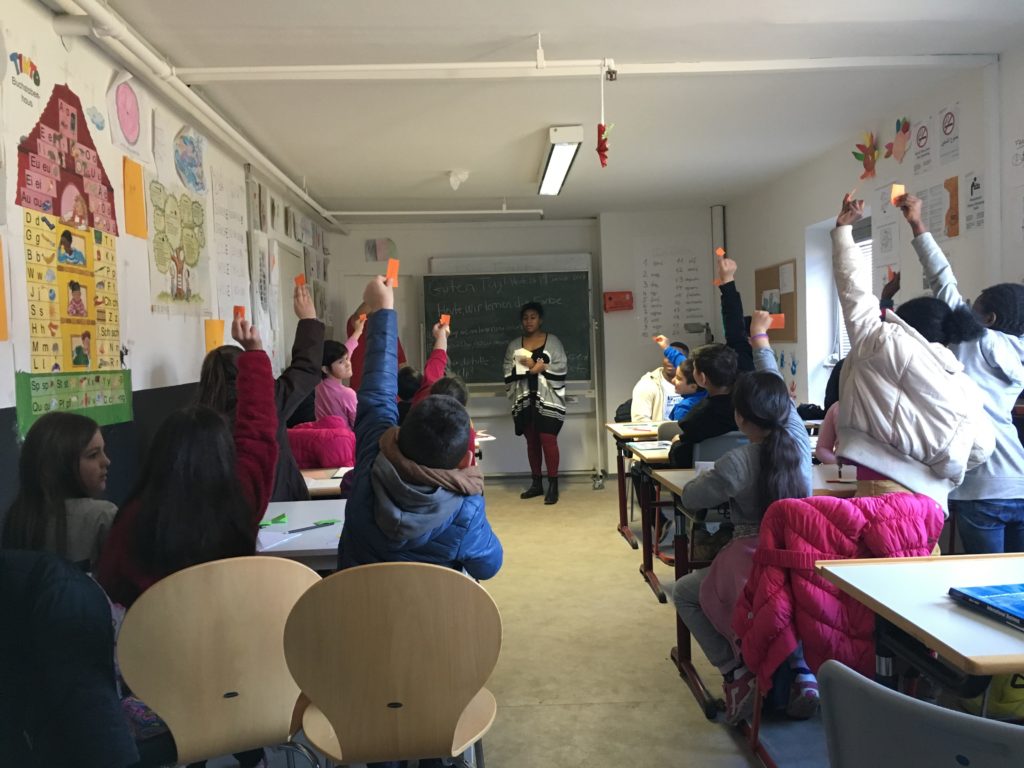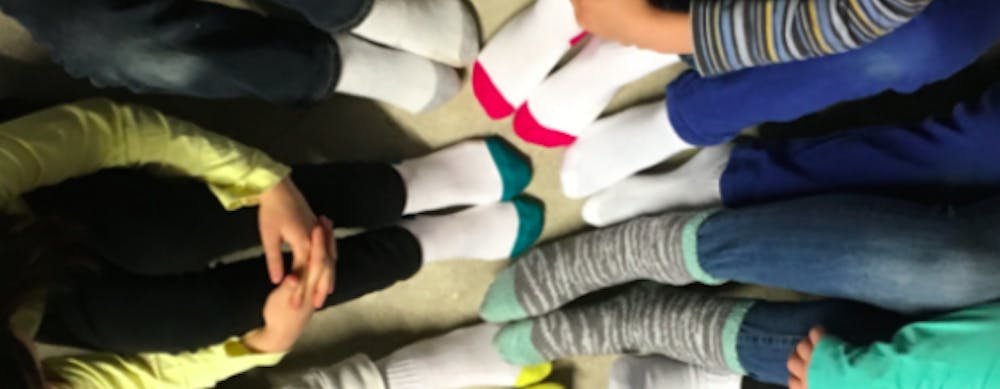By Chelsea LoCascio
Editor-in-Chief
From the comfort of her bed in America, Abrar Ebady checks in with a Syrian refugee living in a war zone via the messaging app WhatsApp, unsure if anyone is on the other end.
“I WhatsApp her to console myself and know that she’s alive,” said Ebady, a senior psychology major at the College. “I can’t send her money — I don’t know what the banking is like — I can’t do anything… and the only glimmer of hope was us taking the pin drop in the ocean of the amount of refugees.”
Ebady, an Egyptian American of Turkish descent and Muslim faith, interned for the Syrian American Medical Association — an education and humanitarian organization for healthcare professionals — in Amman, Jordan over the summer. While she was listening to the stories of traumatized refugees, she met a woman and her daughter who had escaped the horrors of Syria to seek refuge in Jordan.
“Everyone I met at the clinic had trauma,” Ebady said. “Currently, it’s a war zone where she’s living. ... (On my first or second day,) she was so excited that I was there, she just took out her camera and took a picture of me. ... She’s very welcoming and very typical of the Arab culture: hospitable, loving and sweet. You felt the love and kindness radiate from her.”
Without any government assistance, the refugee had to return to Syria. Ever since, Ebady has wondered if she is alive.
Ebady is one of many students at the College affected by their experiences with refugees. When President Donald Trump signed an executive order on Jan. 27 that suspended immigration and restricted entry into the U.S. for nationals from Iran, Iraq, Somalia, Syria and Yemen, it hit people like Ebady “like a ton of bricks.”

The first week
“My heart hurts,” Ebady said. “Even when I talk about it, my heart starts beating faster. I get really anxious because I genuinely feel — and I know this is an irrational thought — but I feel like I failed the people that I met. … It’s like when people see someone from America, they see you as a promise. You’re that glimmer of hope.”
The executive order even prompted a response from College President R. Barbara Gitenstein, who sent an email to the College community on Jan. 30.
“While I strongly believe in the need to take actions that will protect our citizens and the country, I have deep reservations about the specifics of these particular actions,” the email read. “The College of New Jersey has been enriched immeasurably by the contributions of students, faculty and staff from other countries. Indeed, our national heritage is built on welcoming and embracing the vitality and difference that comes from these kinds of contributions.”
In her email, Gitenstein also said she endorses the American Association of State Colleges and Universities’s statement that asks the Trump administration to reconsider the executive order. In addition, she signed a statement along with more than 600 other higher education presidents in the fall that urged the federal government to consider the circumstances of younger people who were “childhood arrivals” from other countries.
“TCNJ will continue to provide support and protection for our students, faculty and staff as allowed by law,” the email read. “Information about the national origin or immigration status of a TCNJ student or employee is private and will not be disclosed without the consent of the individual except as required by law, such as pursuant to a valid subpoena or court order.”
The Signal published a response from faculty members at the College, who penned a letter to Gitenstein asking her to “denounce the executive order.”
“We’re asking you to take a public stand because this executive order is also an assault on institutions of higher education,” the letter read. “This ban will diminish the College’s efforts to be a site of international cooperation and will compromise the transnational production of knowledge. Under this ban, it is quite possible that international students, faculty, staff and researchers will be excluded from our campus, and that some will be stranded away from their families.”

Refugees worldwide
Several students at the College left their families behind to witness the refugee crisis for themselves.
Since Fall 2016, the College’s Heidelberg exchange program has brought students to the Patrick Henry Village in Germany to study the refugee crisis up close, according to Karen Becker, an associate professor of marketing.
“It was my hope that this course and the associated service would allow our students to develop their worldview and meet refugees from all over the world,” Becker said. “I believe one of the only ways we can create understanding and move toward a more peaceful world is through cultural understanding, and this course and service was designed to increase understanding and build empathy.”
The village temporarily houses refugees from Africa, Eastern Europe and the Middle East, according to senior marketing major Nicholas Maldarelli. There, he met a Sri Lankan boy he calls “J” who taught Maldarelli Tamil, his native language. In return, Maldarelli taught him English and Russian.
“This boy had a resounding laugh and jubilant personality,” Maldarelli said. “His broken English was not a barrier in our friendship. … We found similarities and used that common ground to develop a strong friendship that transcended everything I had come to understand about refugees and friendship thus far.”
According to Maldarelli, J was at the village because his late father was executed for an anti-government coup intended to bring justice to the low- and middle-class Sri Lankans who have been extorted and scared through fear-based tactics from their government.
“In my time with J and other children of parents seeking asylum in Germany, I learned that these people were not terrorists, but rather victims of terror,” Maldarelli said. “My eyes and heart were open to hear their stories, share in their tears and do everything in my power to make their troubles of finding a home a little more bearable.”
Olivia Donini, a junior psychology major, is currently studying and volunteering in the Heidelberg village, which comprises about 2,000 refugees who are waiting to be granted asylum or be forced to leave.
“We are all humans,” Donini said. “Although we may come from different locations, have different family dynamics and beliefs, we all are the same in that we were born on this Earth and given the chance to live a fair and happy life.”
Donini admits that being abroad has made her a little disconnected from what is happening in America, but she believes that under any circumstances, a ban is against her fundamental beliefs.
“I think safety is an issue to keep in mind, but I wholeheartedly do not believe that what we are doing right now is morally right,” Donini said. “These people are fleeing their home countries because of issues bigger than some of us can imagine. … And when they come asking the rest of the world for help, regardless of if they are asking America or another country, they deserve kindness, fairness and the help that they need.”
Donini believes people should try to be more empathetic.
“I cannot imagine being forced from my place of comfort, safety and identity,” she said. “We need to stand up for the refugees, for ourselves and for the existence of humankind. This reality could happen to any one of us, and we have to put ourselves in their shoes — which some may not even have — in order to generate the natural empathy and understanding that is the basis of life.”

Checks and balances
The controversial executive order has seen some recent impediments since it was signed. U.S. District Senior Judge James Robart of Seattle issued a nationwide restraining order on Friday, Feb. 3, that blocks the travel ban, according to USA Today.
As a result, airlines were told that the U.S. government would reinstate previously cancelled travel visas, as well as allow refugees with processing U.S. visas to enter, the same source reported.
A federal appeals court denied the Justice Department’s request on Sunday, Feb. 5, to reinstate the president’s executive order, according to The Wall Street Journal.
United or divided?
“So, here you are
too foreign for home
too foreign for here.
Never enough for both.”
- Ijeoma Umebinyuo
After reading Umebinyuo’s words off her phone, Ebady said the poem is the only way to convey her experiences abroad and in the U.S.
“No matter where I go in the world, I’m American. But in America, I’m a threat,” she said.
Ebady believes that this order resulted from fear and a lack of understanding of her Muslim faith.
“My religion really does promote peace, equality,” Ebady said. “My religion doesn’t hate. … In fact, it teaches you that if you kill one person, it’s as if you’ve killed all of mankind and to save one life — it’s as if you’ve saved all of mankind. … That’s really what motivates me — my religion — to be a better person.”
Ebady said she has diverse friends with diverse beliefs — some who are Muslims and others who are non-Muslims, some that believe refugees should be welcomed and others that think they should be turned away from entering the U.S.
“We’re so used to hanging out with people who share the same political ideologies,” Ebady said. “We’re actually limiting ourselves, and we’re, in an essence, creating this segregation that’s dividing us.
“You should be able to sit down with someone of the opposing party and be able to entertain them, entertain their thoughts,” she added. “We’re all products of our environment, products of our upbringing and products of our exposure.”







